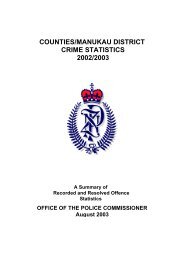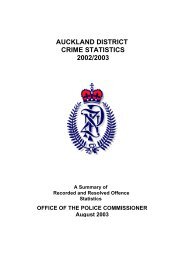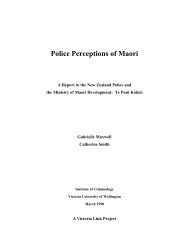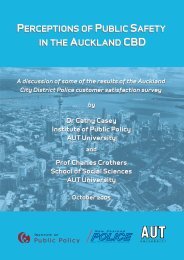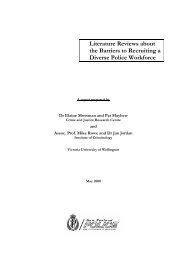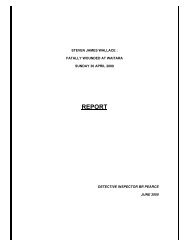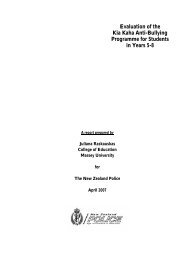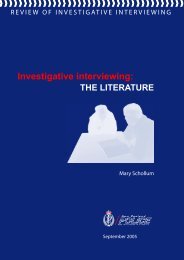Electronic Crime Strategy to 2010 - New Zealand Police
Electronic Crime Strategy to 2010 - New Zealand Police
Electronic Crime Strategy to 2010 - New Zealand Police
Create successful ePaper yourself
Turn your PDF publications into a flip-book with our unique Google optimized e-Paper software.
Environment for Virtualised Evidence (EVE)<br />
Current inability <strong>to</strong> process the high volume of electronic exhibits seized during police<br />
investigations has prompted the need <strong>to</strong> develop a more effective system <strong>to</strong> conduct<br />
these types of specialist investigations.<br />
Project EVE involves the development of a virtual forensic evidence recovery<br />
environment that will move the ability for general investigative interrogation <strong>to</strong> front<br />
line investiga<strong>to</strong>rs via specifically targeted search <strong>to</strong>ols. This approach will save<br />
resources within the specialist ECL being used <strong>to</strong> conduct a host of more mundane<br />
queries and move this functionality directly <strong>to</strong> the investiga<strong>to</strong>r and/or Scene of <strong>Crime</strong><br />
Officers (SOCOs).<br />
EVE will improve investigative capability, better positioning <strong>Police</strong> <strong>to</strong> manage both<br />
current demand and the expected increase in electronic-related crime.<br />
<strong>Police</strong> will implement EVE nationwide, including:<br />
• a targeted training programme for ECL staff and frontline investiga<strong>to</strong>rs<br />
• a mobile EVE for use in court or for investigation at crime scenes or<br />
remote areas<br />
Once proven, there is potential <strong>to</strong> make EVE available <strong>to</strong> other enforcement groups<br />
and jurisdictions, providing benefits beyond <strong>Police</strong>.<br />
E-SOCO<br />
Ensuring appropriate seizure and preservation of computer items for forensic<br />
examination is essential <strong>to</strong> obtaining electronic evidence. EVE simplifies some of<br />
these tasks, reducing the reliance on ECL specialists.<br />
Providing trained e-SOCOs <strong>to</strong> carry out this work will ensure integrity of evidence<br />
is maintained, while reducing the lead time in making such evidence available <strong>to</strong><br />
frontline investiga<strong>to</strong>rs. This will also further reduce the ECL workload, enabling more<br />
focus on specialist evidence recovery.<br />
<strong>Police</strong> will establish the role of e-SOCO, with appropriate training and procedures,<br />
enabling the seizure and transformation of electronic evidence in<strong>to</strong> EVE, without<br />
involvement being required from the ECL.<br />
European Convention on Cyber <strong>Crime</strong><br />
The European Convention on Cyber <strong>Crime</strong> came in<strong>to</strong> force in November 2001,<br />
recognising the urgent need <strong>to</strong> pursue a common criminal policy aimed at the<br />
protection of society against cyber-crime especially, by adopting appropriate<br />
legislation and fostering cooperation between countries and private industry in<br />
combating cyber crime.<br />
Countries signing up <strong>to</strong> the convention are required <strong>to</strong> meet legislative standards<br />
guiding the definition and response <strong>to</strong> cyber crime. <strong>New</strong> <strong>Zealand</strong> legislation<br />
appears <strong>to</strong> align with the convention’s requirements; however these need <strong>to</strong> be<br />
reviewed in detail.<br />
As well as aligning legislation with e-crime internationally, the core benefit for <strong>Police</strong><br />
is the ability <strong>to</strong> progress cyber-based investigations across borders with other<br />
participating countries, extending the reach and speed of investigations.<br />
Currently any evidence obtained<br />
from the examination of<br />
electronic equipment by ECL<br />
staff is s<strong>to</strong>red on individual<br />
hard drives that are held within<br />
caddies and need <strong>to</strong> be loaded<br />
manually for each case <strong>to</strong> be<br />
examined.<br />
With EVE, when a computer<br />
is seized and provided <strong>to</strong> the<br />
ECL, staff will create a virtual<br />
‘image’ from the physical<br />
computer then run specialist<br />
analysis and indexing <strong>to</strong>ols <strong>to</strong><br />
enable the search capability. The<br />
virtual copy is then placed on a<br />
S<strong>to</strong>rage Area Network (SAN) and<br />
made available <strong>to</strong> the frontline<br />
investiga<strong>to</strong>r via the <strong>Police</strong><br />
enterprise network.<br />
When an investiga<strong>to</strong>r accesses<br />
the virtual copy it is loaded as<br />
a virtual machine and they can<br />
then see the computer in the<br />
same way the suspect sees<br />
it. Using simple search <strong>to</strong>ols<br />
the investiga<strong>to</strong>r can quickly<br />
search through the data on the<br />
computer <strong>to</strong> identify anything<br />
relevant <strong>to</strong> the investigation.<br />
The introduction of EVE is<br />
expected <strong>to</strong> reduce lead times<br />
in obtaining electronic evidence<br />
from months down <strong>to</strong> days,<br />
significantly increasing the<br />
throughput of the ECL and the<br />
investigative capability of the<br />
investiga<strong>to</strong>rs.<br />
<strong>Police</strong> will drive any legislative changes required and progress <strong>New</strong> <strong>Zealand</strong>’s<br />
adoption of the European Convention on Cyber <strong>Crime</strong>.<br />
The Council of Europe is made<br />
up of 46 member states.<br />
The European Convention<br />
on Cyber <strong>Crime</strong> is the first<br />
international treaty on crimes<br />
committed via the Internet<br />
and other computer networks,<br />
dealing particularly with<br />
infringements of copyright,<br />
computer-related fraud, child<br />
pornography and violations<br />
of network security. It also<br />
contains a series of powers and<br />
procedures such as the search<br />
of computer networks and<br />
interception.<br />
The Convention is the product<br />
of four years of work by Council<br />
of Europe experts, but also by<br />
the United States, Canada,<br />
Japan and other countries<br />
which are not members of the<br />
organisation.<br />
An additional pro<strong>to</strong>col<br />
supplementing the Convention<br />
makes any publication of racist<br />
and xenophobic propaganda via<br />
computer networks a criminal<br />
offence.<br />
Non-European states who have<br />
signed up <strong>to</strong> the Convention<br />
include:<br />
• United States<br />
• Canada<br />
• Japan<br />
• South Africa<br />
14 E-CRIME STRATEGY TO <strong>2010</strong> E-CRIME STRATEGY TO <strong>2010</strong> 15



